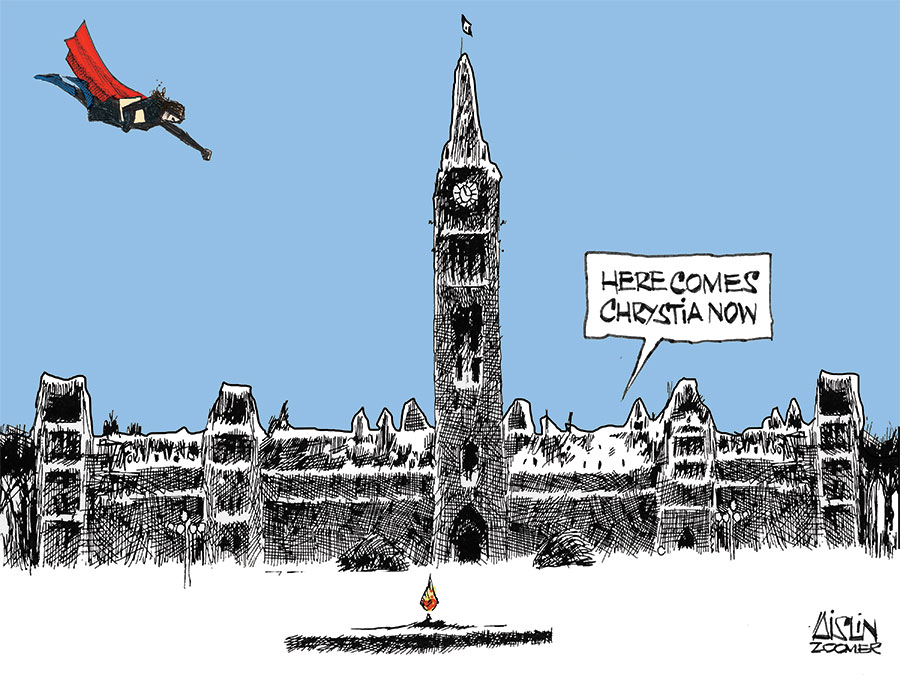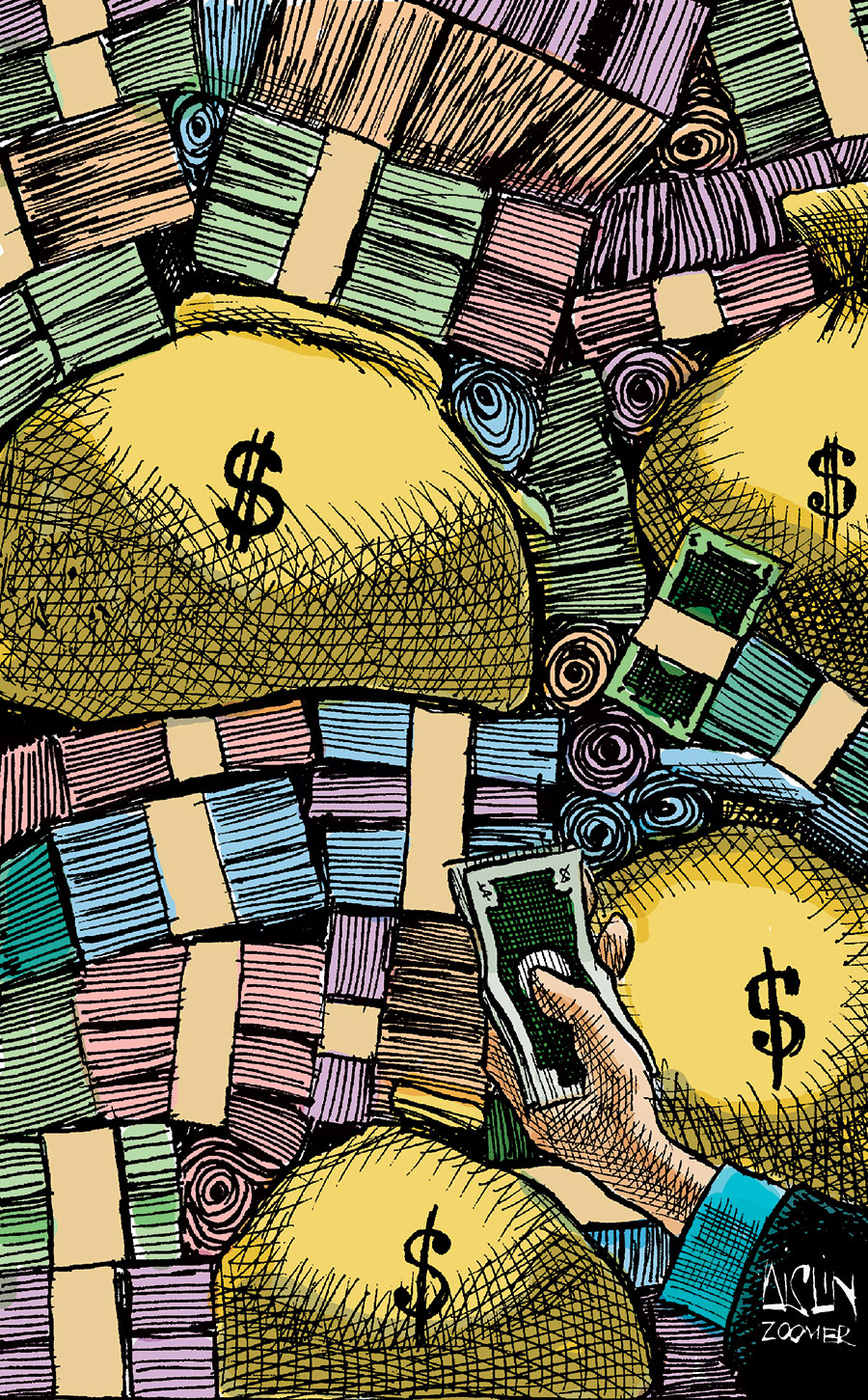Flying Colours: Chrystia Freeland Is Smashing the Patriarchy, But Detractors Dismiss Her as Much as Her Politics

Canada's Deputy Prime Minister and Minister of Finance, Chrystia Freeland, exclusively illustrated for Zoomer by one of Canada's most respected political cartoonists Terry Mosher (aka Aislin).
Chrystia Freeland is now a Halloween costume. It’s a simple one: snug red dress, double-strand pearls. I’ve seen kids on Twitter sporting it. A four-year-old girl showed up on my front porch wearing it with a shaggy wig. (I live in Toronto’s Annex, Freeland’s riding.) I gave her three mini chocolate bars instead of my usual two.
In addition to Freeland’s other accomplishments — speaker of five languages, mother of three children, Harvard and Oxford graduate, Rhodes Scholar, journalist, editor, bestselling author, Foreign Policy magazine’s diplomat of the year in 2018, Canada’s current deputy prime minister and minister of finance — that Halloween costume proves she’s a pop culture icon. She’s recognizable not only for her red/pearl uniform, but also for what many people wish for themselves: her authenticity.
That authenticity — her innate, unapologetic Chrystia-ness — drives her detractors crazy. She’s idealistic to the point of naïveté, they say. She’s too sure of herself. She’s shrill (that one in particular drives me crazy). Some claim she’s too detail-oriented, too meticulous. A minister needs to delegate, they say; she gets lost in the weeds. She takes politics personally. She makes it personal. And her voice — nasal, up-talky? Not for them.
But let’s discuss whether Freeland’s authenticity has steered her wrong. Her idealism, for starters. Isn’t Canada supposed to be idealistic? Aren’t our ideals our strength, what distinguishes us on the world stage? When Freeland first became minister of international trade (2015-17) and later minister of foreign affairs (2017-19), she hoped that including autocratic regimes in international trade agreements might incline them toward more democratic ideals. But as the autocracies hardened, her thinking evolved. Now she sees a world where democracy is under threat, and is crafting policies to protect it. Don’t we want leaders to adjust as things change?
Freeland warned us about human rights violations in Venezuela and China. She stands up for women in Iran. Fluent in Russian and a former Moscow bureau chief for the Financial Times, she sent up alarms after Russia’s invasion of Crimea. (In retaliation, Putin sanctioned her in 2014; she still can’t fly there.) A Ukrainian by heritage — her late mother was a prominent intellectual who helped draft the country’s post-Soviet constitution — she’s always perceived the threats to Ukraine. Where was she wrong?

In 2018, when she aggravated the Saudi royal family with a tweet calling for the release of two jailed human rights activists, the Saudis reacted by recalling their ambassador to Ottawa, cancelling direct flights between Toronto and Riyadh, and pressuring Saudi students to leave Canada — and then they called her immature. That October, journalist Jamal Khashoggi was murdered. “We need to be honest with ourselves and honest with Canadians that standing up on these issues will not always be without a cost,” Freeland has said. “And that’s okay.”
Now let’s look at her self-confidence. She’s a voracious reader; no one does more homework. She listens to her team, and also solicits takes from everyone, from academics, CEOs and journalists to constituents and random shoppers at the supermarket. In 2018, when she was renegotiating the North American Free Trade Agreement (now the Canada-United States-Mexico Agreement, or CUSMA), she consulted with lumbermen, miners and manufacturers, to make sure that actual Canadian businesspeople would benefit. A former journalist, she knows the tricks, so she speaks carefully. She crafts her own speeches and edits them until she steps up to the podium. So when she enters a room, she knows — she knows — she’s as informed as anyone in it.
She’s not afraid to be tough. The people who think they can intimidate a small woman from a small country (population wise)? She’s not intimidated by them. When Canadian CEOs warned her that the Ottawa truck convoy was scaring off international investors, she replied, “If the investor you speak of is American, tell them we are not like the U.S.A. who had people literally invade their legislature. If they are a Brit, remind them of Brexit. If they are French, remind them of the Yellow Vests. If they are German, look at how badly they are handling Russia right now.” In her current positions, she’s guided Canada through the COVID-19 crisis and the resulting economic fallout with as much care as any country on Earth. She’s tethered herself to Prime Minister Justin Trudeau, knowing full well the summit they’re climbing might be a glass cliff off of which she gets tossed. But she’s taking that risk, because she knows what she believes in.
As for making it personal, that’s Freeland’s superpower. She doesn’t only study the issues, she studies the players. She goes out of her way to build personal relationships. In 2017, she made lunch for U.S. political legend Madeleine Albright. During the 2018 G7 summit, she invited the foreign ministers to her home, and her children served the brunch. For politicians who live by agendas and prepared notes, that’s disarming — and she knows it.

During the CUSMA negotiations, with more than US$1 trillion in trade on the line, she delivered a scorching speech, in Washington, D.C., calling Donald Trump’s America-first tariffs “a naked example of the United States putting its thumb on the scale,” and then, to drive the point home, handed a copy of the speech to her U.S. trade counterpart, Robert Lighthizer. Three months later, the deal was struck, and Lighthizer was flying to Toronto to have dinner at Freeland’s home. She served him roast beef.
Last, but most important, is Freeland’s personal style. At the Globe and Mail, where she was deputy editor from 1999 to 2001 (and for whom I freelance), she was famous for her slightly chaotic grooming — multiple bags, undone hair, clothes that never seemed to sit still. Her blouses would gape, her skirts would ride up. But why? Because she didn’t care about that stuff. Her bags were full because she had kids. Her blouse buttons popped because she was leaning forward to share ideas. She lived in her head, where so many things mattered more than grooming. When she entered politics, someone savvy about image creation strapped her into her now-trademark look, but she remains herself: She still bicycles to events when she can, changing in public from her sneakers into her heels. If it gets late enough, she kicks them off. At a 2021 meeting of finance ministers before the G7 summit in London, she was photographed in bare feet, deep in conversation with Rishi Sunak, then the U.K.’s Chancellor of the Exchequer. Don’t think she doesn’t know what she’s doing there, too.
So let’s cut to the heart of the matter. Why did John Doyle, the Globe’s former television critic, call Freeland one of Canada’s most irritating people, accuse her of “preening,” and mock her “one red dress after another”? Why did he feel compelled to add, “And no, that’s not sexist”? Because it was sexist. It still is. Would anyone ever criticize a man for wearing one blue suit after another? As Hillary Clinton, who knows from sexism — she’s arguably the most qualified candidate to ever run for U.S. president, only to be beaten by the least qualified – wrote about being U.S. secretary of state: A woman can fly around the world for 40 hours and put out half a dozen diplomatic fires, but when she gets off the plane the first thing people say is that her hair is a mess.
With her double-strand pearls and her double-wide brain, Freeland is fighting a patriarchy so entrenched, even most women don’t realize how deeply they’ve bought in. Far too many of us still wrinkle our noses at brainiac girls – the Tracy Flicks, forever jabbing their hands up, because they always know the answer first. (Flick is the protagonist in Tom Perrotta’s novel Election, played by Reese Witherspoon in the film.) We still disdain a bossy pants, Tina Fey writes in her memoir of the same name. (And we call a woman crazy, Fey adds, when she keeps talking even when no one wants to have sex with her.) Many of us want our daughters to be all the things Freeland is — smart, successful, self-confident — just … not like her. Far too many of us, like the shouting protester couple who cornered Freeland in an Alberta hotel lobby in August, still conflate “powerful woman” with “f–king bitch.”
“We don’t like their representative very much,” Trump infamously tweeted, most likely referring to Freeland, during the CUSMA negotiations. Which is a badge of honour. And also infinitely sad. Because when does a woman’s speaking voice hurt “our” ears? When she’s saying something true that we don’t want to hear.
A version this article appeared in the Feb/Mar 2023 issue with the headline ‘Flying Colours’, p. 30.
RELATED:
Chrystia Freeland Pledges New Spending, Promises Not to Fuel Inflation in Fall Economic Statement
Trudeau and Freeland Affirm Right to Choose After Draft Ruling Overturning Roe v. Wade Leaks